Should Assisted Dying Be Legalised in the UK?
VerifiedAdded on 2024/06/25
|10
|2782
|125
AI Summary
This essay explores the complex ethical and legal considerations surrounding the legalization of assisted dying in the UK. It examines arguments for and against the practice, considering the rights of individuals with terminal illnesses, the role of healthcare professionals, and the potential for abuse. The essay also discusses the impact of assisted dying on society, including religious perspectives and the cost of healthcare. Ultimately, it concludes that while assisted dying raises significant ethical concerns, it is a complex issue that requires careful consideration and a nuanced approach.
Contribute Materials
Your contribution can guide someone’s learning journey. Share your
documents today.

SHOULD ASSISTED DYING BE LEGALISED IN THE UK
Contents
SHOULD ASSISTED DYING BE LEGALISED IN THE UK........................................................1
Introduction........................................................................................................................................... 1
Conclusion.............................................................................................................................................. 7
References.............................................................................................................................................. 8
1
Contents
SHOULD ASSISTED DYING BE LEGALISED IN THE UK........................................................1
Introduction........................................................................................................................................... 1
Conclusion.............................................................................................................................................. 7
References.............................................................................................................................................. 8
1
Secure Best Marks with AI Grader
Need help grading? Try our AI Grader for instant feedback on your assignments.
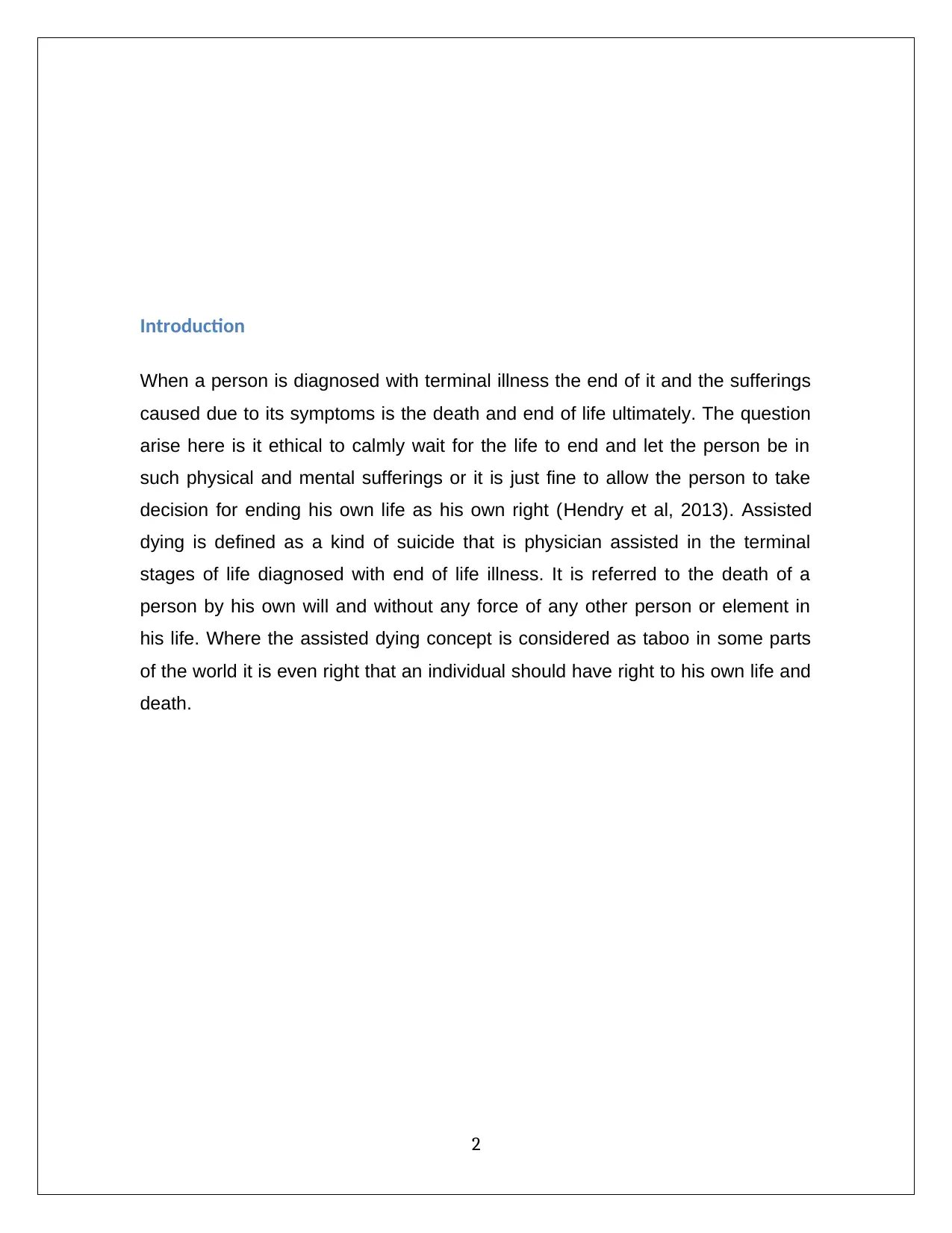
Introduction
When a person is diagnosed with terminal illness the end of it and the sufferings
caused due to its symptoms is the death and end of life ultimately. The question
arise here is it ethical to calmly wait for the life to end and let the person be in
such physical and mental sufferings or it is just fine to allow the person to take
decision for ending his own life as his own right (Hendry et al, 2013). Assisted
dying is defined as a kind of suicide that is physician assisted in the terminal
stages of life diagnosed with end of life illness. It is referred to the death of a
person by his own will and without any force of any other person or element in
his life. Where the assisted dying concept is considered as taboo in some parts
of the world it is even right that an individual should have right to his own life and
death.
2
When a person is diagnosed with terminal illness the end of it and the sufferings
caused due to its symptoms is the death and end of life ultimately. The question
arise here is it ethical to calmly wait for the life to end and let the person be in
such physical and mental sufferings or it is just fine to allow the person to take
decision for ending his own life as his own right (Hendry et al, 2013). Assisted
dying is defined as a kind of suicide that is physician assisted in the terminal
stages of life diagnosed with end of life illness. It is referred to the death of a
person by his own will and without any force of any other person or element in
his life. Where the assisted dying concept is considered as taboo in some parts
of the world it is even right that an individual should have right to his own life and
death.
2
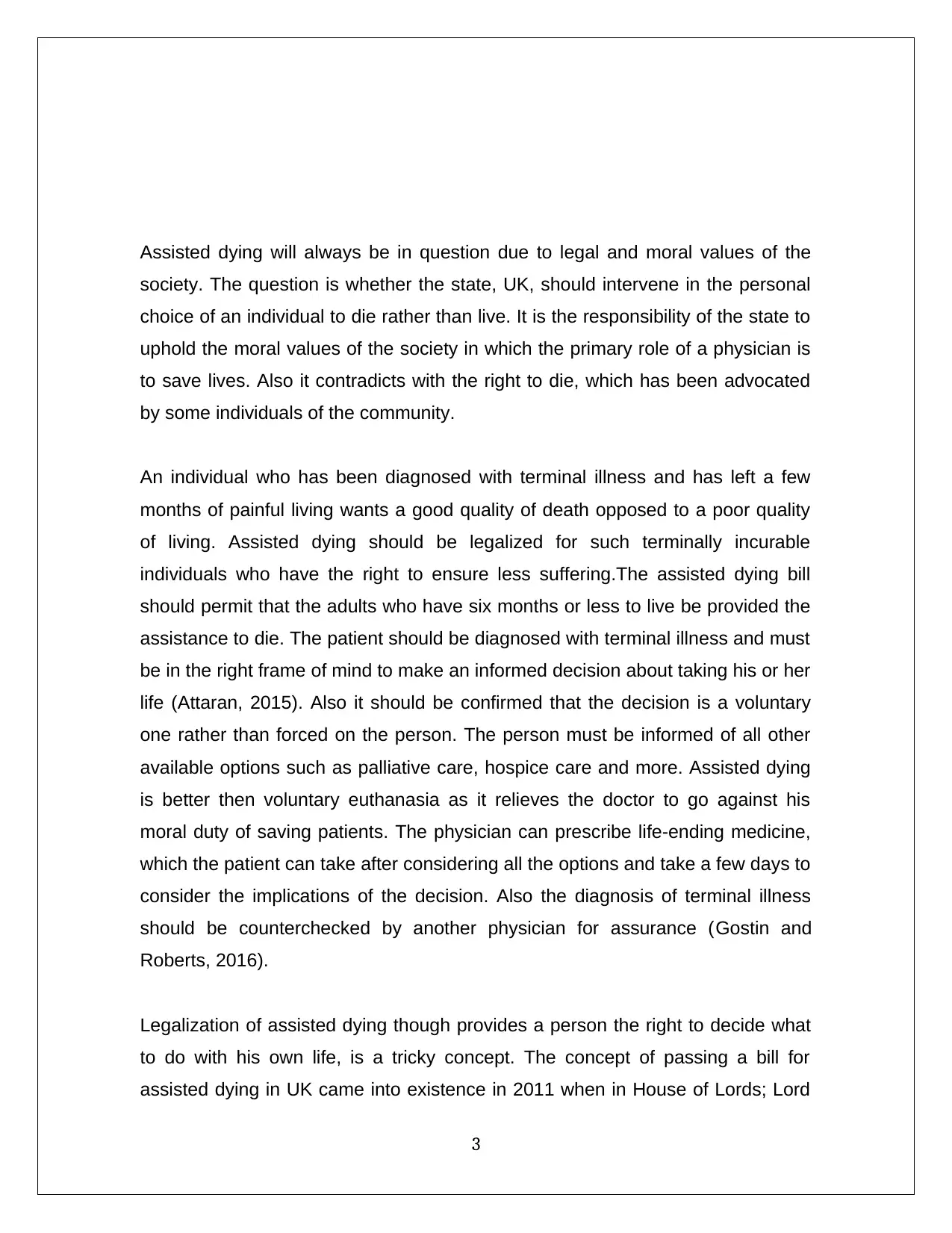
Assisted dying will always be in question due to legal and moral values of the
society. The question is whether the state, UK, should intervene in the personal
choice of an individual to die rather than live. It is the responsibility of the state to
uphold the moral values of the society in which the primary role of a physician is
to save lives. Also it contradicts with the right to die, which has been advocated
by some individuals of the community.
An individual who has been diagnosed with terminal illness and has left a few
months of painful living wants a good quality of death opposed to a poor quality
of living. Assisted dying should be legalized for such terminally incurable
individuals who have the right to ensure less suffering.The assisted dying bill
should permit that the adults who have six months or less to live be provided the
assistance to die. The patient should be diagnosed with terminal illness and must
be in the right frame of mind to make an informed decision about taking his or her
life (Attaran, 2015). Also it should be confirmed that the decision is a voluntary
one rather than forced on the person. The person must be informed of all other
available options such as palliative care, hospice care and more. Assisted dying
is better then voluntary euthanasia as it relieves the doctor to go against his
moral duty of saving patients. The physician can prescribe life-ending medicine,
which the patient can take after considering all the options and take a few days to
consider the implications of the decision. Also the diagnosis of terminal illness
should be counterchecked by another physician for assurance (Gostin and
Roberts, 2016).
Legalization of assisted dying though provides a person the right to decide what
to do with his own life, is a tricky concept. The concept of passing a bill for
assisted dying in UK came into existence in 2011 when in House of Lords; Lord
3
society. The question is whether the state, UK, should intervene in the personal
choice of an individual to die rather than live. It is the responsibility of the state to
uphold the moral values of the society in which the primary role of a physician is
to save lives. Also it contradicts with the right to die, which has been advocated
by some individuals of the community.
An individual who has been diagnosed with terminal illness and has left a few
months of painful living wants a good quality of death opposed to a poor quality
of living. Assisted dying should be legalized for such terminally incurable
individuals who have the right to ensure less suffering.The assisted dying bill
should permit that the adults who have six months or less to live be provided the
assistance to die. The patient should be diagnosed with terminal illness and must
be in the right frame of mind to make an informed decision about taking his or her
life (Attaran, 2015). Also it should be confirmed that the decision is a voluntary
one rather than forced on the person. The person must be informed of all other
available options such as palliative care, hospice care and more. Assisted dying
is better then voluntary euthanasia as it relieves the doctor to go against his
moral duty of saving patients. The physician can prescribe life-ending medicine,
which the patient can take after considering all the options and take a few days to
consider the implications of the decision. Also the diagnosis of terminal illness
should be counterchecked by another physician for assurance (Gostin and
Roberts, 2016).
Legalization of assisted dying though provides a person the right to decide what
to do with his own life, is a tricky concept. The concept of passing a bill for
assisted dying in UK came into existence in 2011 when in House of Lords; Lord
3
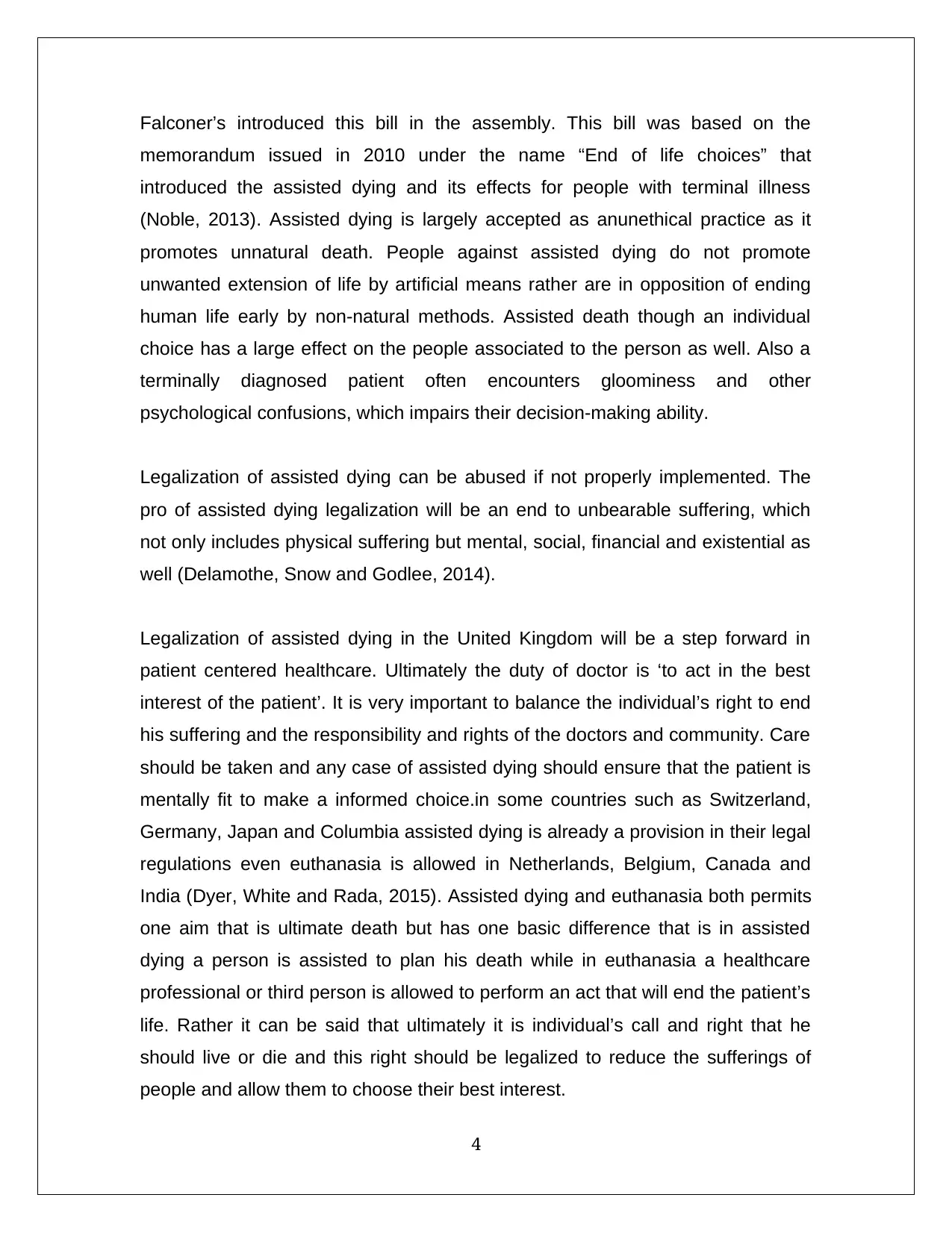
Falconer’s introduced this bill in the assembly. This bill was based on the
memorandum issued in 2010 under the name “End of life choices” that
introduced the assisted dying and its effects for people with terminal illness
(Noble, 2013). Assisted dying is largely accepted as anunethical practice as it
promotes unnatural death. People against assisted dying do not promote
unwanted extension of life by artificial means rather are in opposition of ending
human life early by non-natural methods. Assisted death though an individual
choice has a large effect on the people associated to the person as well. Also a
terminally diagnosed patient often encounters gloominess and other
psychological confusions, which impairs their decision-making ability.
Legalization of assisted dying can be abused if not properly implemented. The
pro of assisted dying legalization will be an end to unbearable suffering, which
not only includes physical suffering but mental, social, financial and existential as
well (Delamothe, Snow and Godlee, 2014).
Legalization of assisted dying in the United Kingdom will be a step forward in
patient centered healthcare. Ultimately the duty of doctor is ‘to act in the best
interest of the patient’. It is very important to balance the individual’s right to end
his suffering and the responsibility and rights of the doctors and community. Care
should be taken and any case of assisted dying should ensure that the patient is
mentally fit to make a informed choice.in some countries such as Switzerland,
Germany, Japan and Columbia assisted dying is already a provision in their legal
regulations even euthanasia is allowed in Netherlands, Belgium, Canada and
India (Dyer, White and Rada, 2015). Assisted dying and euthanasia both permits
one aim that is ultimate death but has one basic difference that is in assisted
dying a person is assisted to plan his death while in euthanasia a healthcare
professional or third person is allowed to perform an act that will end the patient’s
life. Rather it can be said that ultimately it is individual’s call and right that he
should live or die and this right should be legalized to reduce the sufferings of
people and allow them to choose their best interest.
4
memorandum issued in 2010 under the name “End of life choices” that
introduced the assisted dying and its effects for people with terminal illness
(Noble, 2013). Assisted dying is largely accepted as anunethical practice as it
promotes unnatural death. People against assisted dying do not promote
unwanted extension of life by artificial means rather are in opposition of ending
human life early by non-natural methods. Assisted death though an individual
choice has a large effect on the people associated to the person as well. Also a
terminally diagnosed patient often encounters gloominess and other
psychological confusions, which impairs their decision-making ability.
Legalization of assisted dying can be abused if not properly implemented. The
pro of assisted dying legalization will be an end to unbearable suffering, which
not only includes physical suffering but mental, social, financial and existential as
well (Delamothe, Snow and Godlee, 2014).
Legalization of assisted dying in the United Kingdom will be a step forward in
patient centered healthcare. Ultimately the duty of doctor is ‘to act in the best
interest of the patient’. It is very important to balance the individual’s right to end
his suffering and the responsibility and rights of the doctors and community. Care
should be taken and any case of assisted dying should ensure that the patient is
mentally fit to make a informed choice.in some countries such as Switzerland,
Germany, Japan and Columbia assisted dying is already a provision in their legal
regulations even euthanasia is allowed in Netherlands, Belgium, Canada and
India (Dyer, White and Rada, 2015). Assisted dying and euthanasia both permits
one aim that is ultimate death but has one basic difference that is in assisted
dying a person is assisted to plan his death while in euthanasia a healthcare
professional or third person is allowed to perform an act that will end the patient’s
life. Rather it can be said that ultimately it is individual’s call and right that he
should live or die and this right should be legalized to reduce the sufferings of
people and allow them to choose their best interest.
4
Secure Best Marks with AI Grader
Need help grading? Try our AI Grader for instant feedback on your assignments.
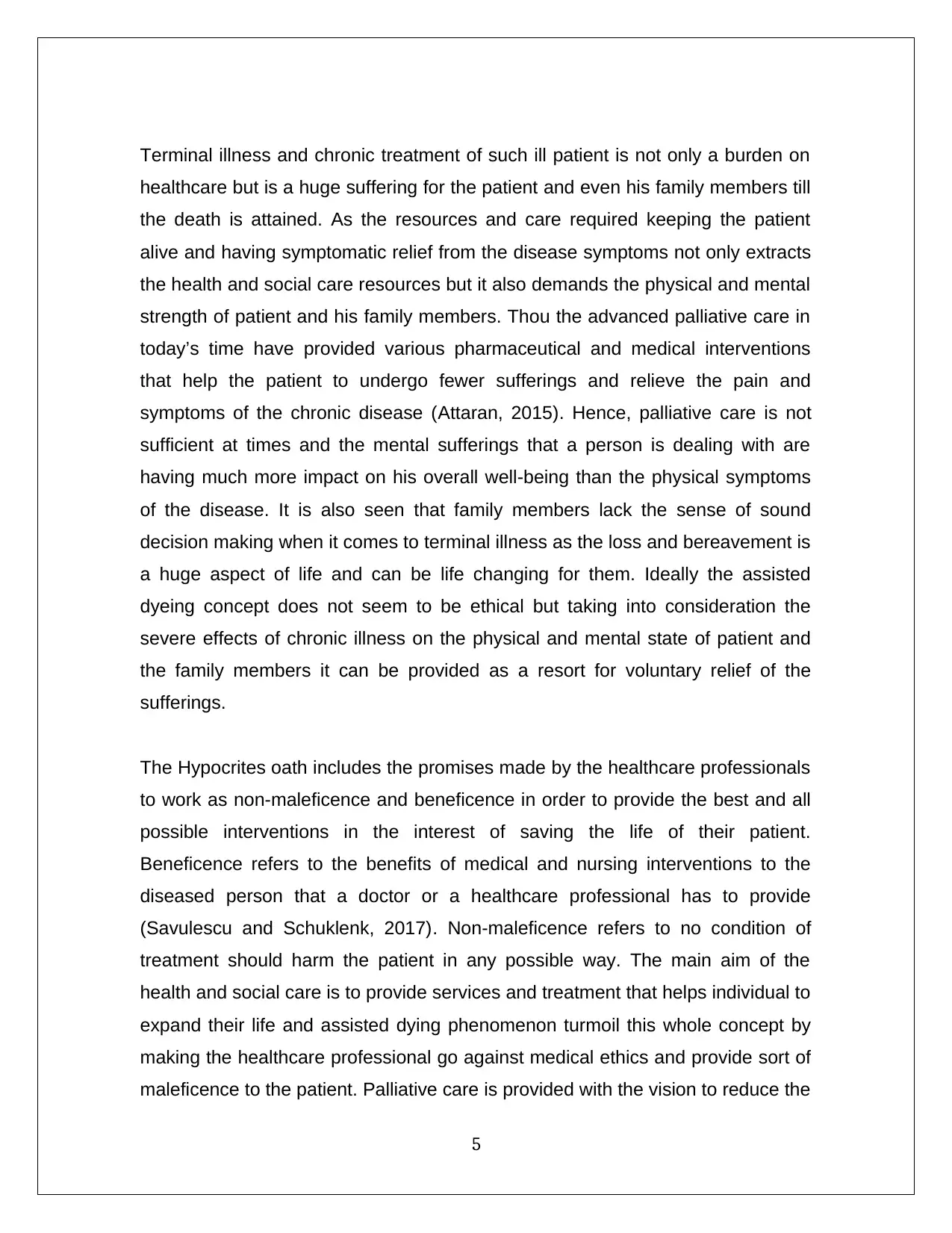
Terminal illness and chronic treatment of such ill patient is not only a burden on
healthcare but is a huge suffering for the patient and even his family members till
the death is attained. As the resources and care required keeping the patient
alive and having symptomatic relief from the disease symptoms not only extracts
the health and social care resources but it also demands the physical and mental
strength of patient and his family members. Thou the advanced palliative care in
today’s time have provided various pharmaceutical and medical interventions
that help the patient to undergo fewer sufferings and relieve the pain and
symptoms of the chronic disease (Attaran, 2015). Hence, palliative care is not
sufficient at times and the mental sufferings that a person is dealing with are
having much more impact on his overall well-being than the physical symptoms
of the disease. It is also seen that family members lack the sense of sound
decision making when it comes to terminal illness as the loss and bereavement is
a huge aspect of life and can be life changing for them. Ideally the assisted
dyeing concept does not seem to be ethical but taking into consideration the
severe effects of chronic illness on the physical and mental state of patient and
the family members it can be provided as a resort for voluntary relief of the
sufferings.
The Hypocrites oath includes the promises made by the healthcare professionals
to work as non-maleficence and beneficence in order to provide the best and all
possible interventions in the interest of saving the life of their patient.
Beneficence refers to the benefits of medical and nursing interventions to the
diseased person that a doctor or a healthcare professional has to provide
(Savulescu and Schuklenk, 2017). Non-maleficence refers to no condition of
treatment should harm the patient in any possible way. The main aim of the
health and social care is to provide services and treatment that helps individual to
expand their life and assisted dying phenomenon turmoil this whole concept by
making the healthcare professional go against medical ethics and provide sort of
maleficence to the patient. Palliative care is provided with the vision to reduce the
5
healthcare but is a huge suffering for the patient and even his family members till
the death is attained. As the resources and care required keeping the patient
alive and having symptomatic relief from the disease symptoms not only extracts
the health and social care resources but it also demands the physical and mental
strength of patient and his family members. Thou the advanced palliative care in
today’s time have provided various pharmaceutical and medical interventions
that help the patient to undergo fewer sufferings and relieve the pain and
symptoms of the chronic disease (Attaran, 2015). Hence, palliative care is not
sufficient at times and the mental sufferings that a person is dealing with are
having much more impact on his overall well-being than the physical symptoms
of the disease. It is also seen that family members lack the sense of sound
decision making when it comes to terminal illness as the loss and bereavement is
a huge aspect of life and can be life changing for them. Ideally the assisted
dyeing concept does not seem to be ethical but taking into consideration the
severe effects of chronic illness on the physical and mental state of patient and
the family members it can be provided as a resort for voluntary relief of the
sufferings.
The Hypocrites oath includes the promises made by the healthcare professionals
to work as non-maleficence and beneficence in order to provide the best and all
possible interventions in the interest of saving the life of their patient.
Beneficence refers to the benefits of medical and nursing interventions to the
diseased person that a doctor or a healthcare professional has to provide
(Savulescu and Schuklenk, 2017). Non-maleficence refers to no condition of
treatment should harm the patient in any possible way. The main aim of the
health and social care is to provide services and treatment that helps individual to
expand their life and assisted dying phenomenon turmoil this whole concept by
making the healthcare professional go against medical ethics and provide sort of
maleficence to the patient. Palliative care is provided with the vision to reduce the
5
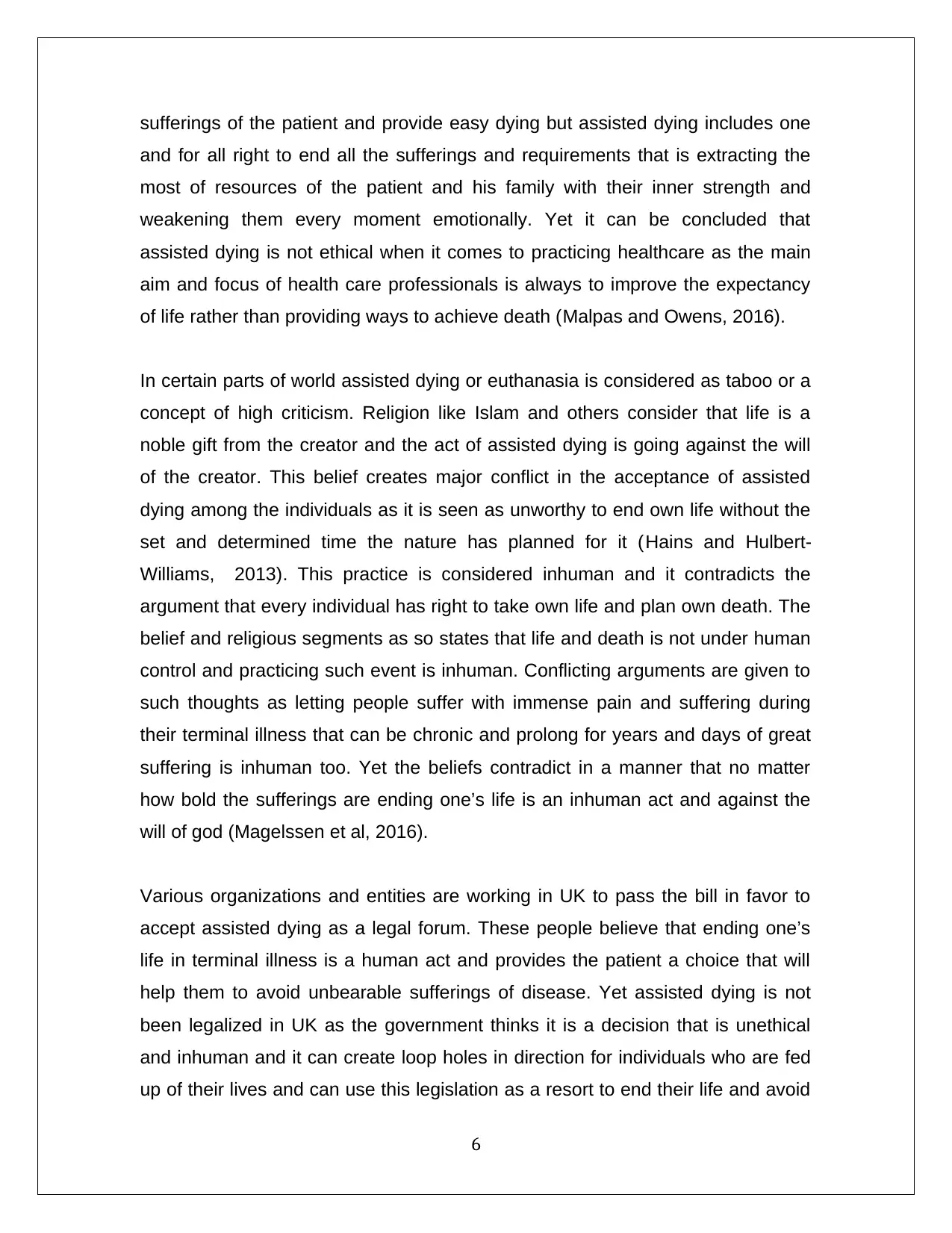
sufferings of the patient and provide easy dying but assisted dying includes one
and for all right to end all the sufferings and requirements that is extracting the
most of resources of the patient and his family with their inner strength and
weakening them every moment emotionally. Yet it can be concluded that
assisted dying is not ethical when it comes to practicing healthcare as the main
aim and focus of health care professionals is always to improve the expectancy
of life rather than providing ways to achieve death (Malpas and Owens, 2016).
In certain parts of world assisted dying or euthanasia is considered as taboo or a
concept of high criticism. Religion like Islam and others consider that life is a
noble gift from the creator and the act of assisted dying is going against the will
of the creator. This belief creates major conflict in the acceptance of assisted
dying among the individuals as it is seen as unworthy to end own life without the
set and determined time the nature has planned for it (Hains and Hulbert-
Williams, 2013). This practice is considered inhuman and it contradicts the
argument that every individual has right to take own life and plan own death. The
belief and religious segments as so states that life and death is not under human
control and practicing such event is inhuman. Conflicting arguments are given to
such thoughts as letting people suffer with immense pain and suffering during
their terminal illness that can be chronic and prolong for years and days of great
suffering is inhuman too. Yet the beliefs contradict in a manner that no matter
how bold the sufferings are ending one’s life is an inhuman act and against the
will of god (Magelssen et al, 2016).
Various organizations and entities are working in UK to pass the bill in favor to
accept assisted dying as a legal forum. These people believe that ending one’s
life in terminal illness is a human act and provides the patient a choice that will
help them to avoid unbearable sufferings of disease. Yet assisted dying is not
been legalized in UK as the government thinks it is a decision that is unethical
and inhuman and it can create loop holes in direction for individuals who are fed
up of their lives and can use this legislation as a resort to end their life and avoid
6
and for all right to end all the sufferings and requirements that is extracting the
most of resources of the patient and his family with their inner strength and
weakening them every moment emotionally. Yet it can be concluded that
assisted dying is not ethical when it comes to practicing healthcare as the main
aim and focus of health care professionals is always to improve the expectancy
of life rather than providing ways to achieve death (Malpas and Owens, 2016).
In certain parts of world assisted dying or euthanasia is considered as taboo or a
concept of high criticism. Religion like Islam and others consider that life is a
noble gift from the creator and the act of assisted dying is going against the will
of the creator. This belief creates major conflict in the acceptance of assisted
dying among the individuals as it is seen as unworthy to end own life without the
set and determined time the nature has planned for it (Hains and Hulbert-
Williams, 2013). This practice is considered inhuman and it contradicts the
argument that every individual has right to take own life and plan own death. The
belief and religious segments as so states that life and death is not under human
control and practicing such event is inhuman. Conflicting arguments are given to
such thoughts as letting people suffer with immense pain and suffering during
their terminal illness that can be chronic and prolong for years and days of great
suffering is inhuman too. Yet the beliefs contradict in a manner that no matter
how bold the sufferings are ending one’s life is an inhuman act and against the
will of god (Magelssen et al, 2016).
Various organizations and entities are working in UK to pass the bill in favor to
accept assisted dying as a legal forum. These people believe that ending one’s
life in terminal illness is a human act and provides the patient a choice that will
help them to avoid unbearable sufferings of disease. Yet assisted dying is not
been legalized in UK as the government thinks it is a decision that is unethical
and inhuman and it can create loop holes in direction for individuals who are fed
up of their lives and can use this legislation as a resort to end their life and avoid
6
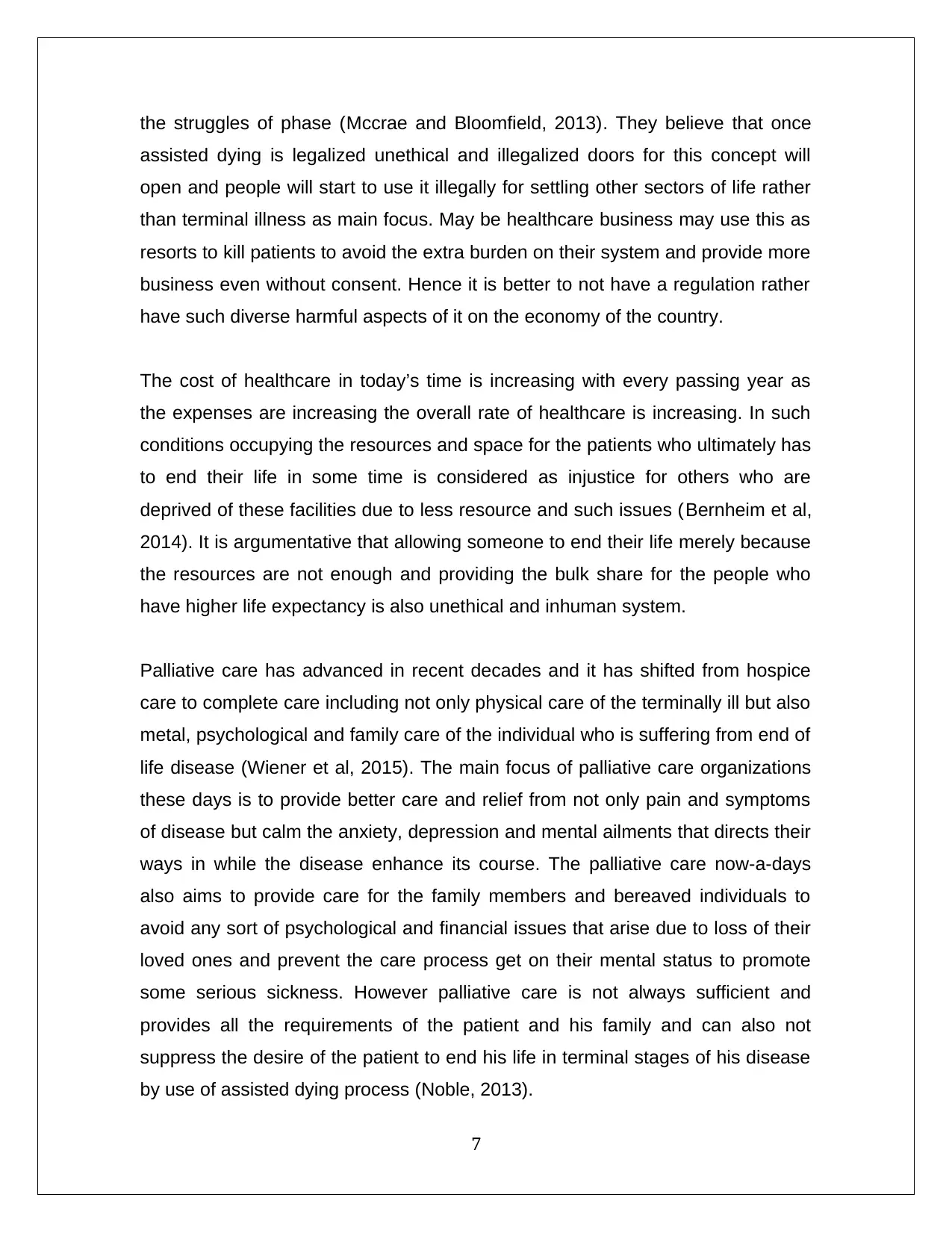
the struggles of phase (Mccrae and Bloomfield, 2013). They believe that once
assisted dying is legalized unethical and illegalized doors for this concept will
open and people will start to use it illegally for settling other sectors of life rather
than terminal illness as main focus. May be healthcare business may use this as
resorts to kill patients to avoid the extra burden on their system and provide more
business even without consent. Hence it is better to not have a regulation rather
have such diverse harmful aspects of it on the economy of the country.
The cost of healthcare in today’s time is increasing with every passing year as
the expenses are increasing the overall rate of healthcare is increasing. In such
conditions occupying the resources and space for the patients who ultimately has
to end their life in some time is considered as injustice for others who are
deprived of these facilities due to less resource and such issues (Bernheim et al,
2014). It is argumentative that allowing someone to end their life merely because
the resources are not enough and providing the bulk share for the people who
have higher life expectancy is also unethical and inhuman system.
Palliative care has advanced in recent decades and it has shifted from hospice
care to complete care including not only physical care of the terminally ill but also
metal, psychological and family care of the individual who is suffering from end of
life disease (Wiener et al, 2015). The main focus of palliative care organizations
these days is to provide better care and relief from not only pain and symptoms
of disease but calm the anxiety, depression and mental ailments that directs their
ways in while the disease enhance its course. The palliative care now-a-days
also aims to provide care for the family members and bereaved individuals to
avoid any sort of psychological and financial issues that arise due to loss of their
loved ones and prevent the care process get on their mental status to promote
some serious sickness. However palliative care is not always sufficient and
provides all the requirements of the patient and his family and can also not
suppress the desire of the patient to end his life in terminal stages of his disease
by use of assisted dying process (Noble, 2013).
7
assisted dying is legalized unethical and illegalized doors for this concept will
open and people will start to use it illegally for settling other sectors of life rather
than terminal illness as main focus. May be healthcare business may use this as
resorts to kill patients to avoid the extra burden on their system and provide more
business even without consent. Hence it is better to not have a regulation rather
have such diverse harmful aspects of it on the economy of the country.
The cost of healthcare in today’s time is increasing with every passing year as
the expenses are increasing the overall rate of healthcare is increasing. In such
conditions occupying the resources and space for the patients who ultimately has
to end their life in some time is considered as injustice for others who are
deprived of these facilities due to less resource and such issues (Bernheim et al,
2014). It is argumentative that allowing someone to end their life merely because
the resources are not enough and providing the bulk share for the people who
have higher life expectancy is also unethical and inhuman system.
Palliative care has advanced in recent decades and it has shifted from hospice
care to complete care including not only physical care of the terminally ill but also
metal, psychological and family care of the individual who is suffering from end of
life disease (Wiener et al, 2015). The main focus of palliative care organizations
these days is to provide better care and relief from not only pain and symptoms
of disease but calm the anxiety, depression and mental ailments that directs their
ways in while the disease enhance its course. The palliative care now-a-days
also aims to provide care for the family members and bereaved individuals to
avoid any sort of psychological and financial issues that arise due to loss of their
loved ones and prevent the care process get on their mental status to promote
some serious sickness. However palliative care is not always sufficient and
provides all the requirements of the patient and his family and can also not
suppress the desire of the patient to end his life in terminal stages of his disease
by use of assisted dying process (Noble, 2013).
7
Paraphrase This Document
Need a fresh take? Get an instant paraphrase of this document with our AI Paraphraser
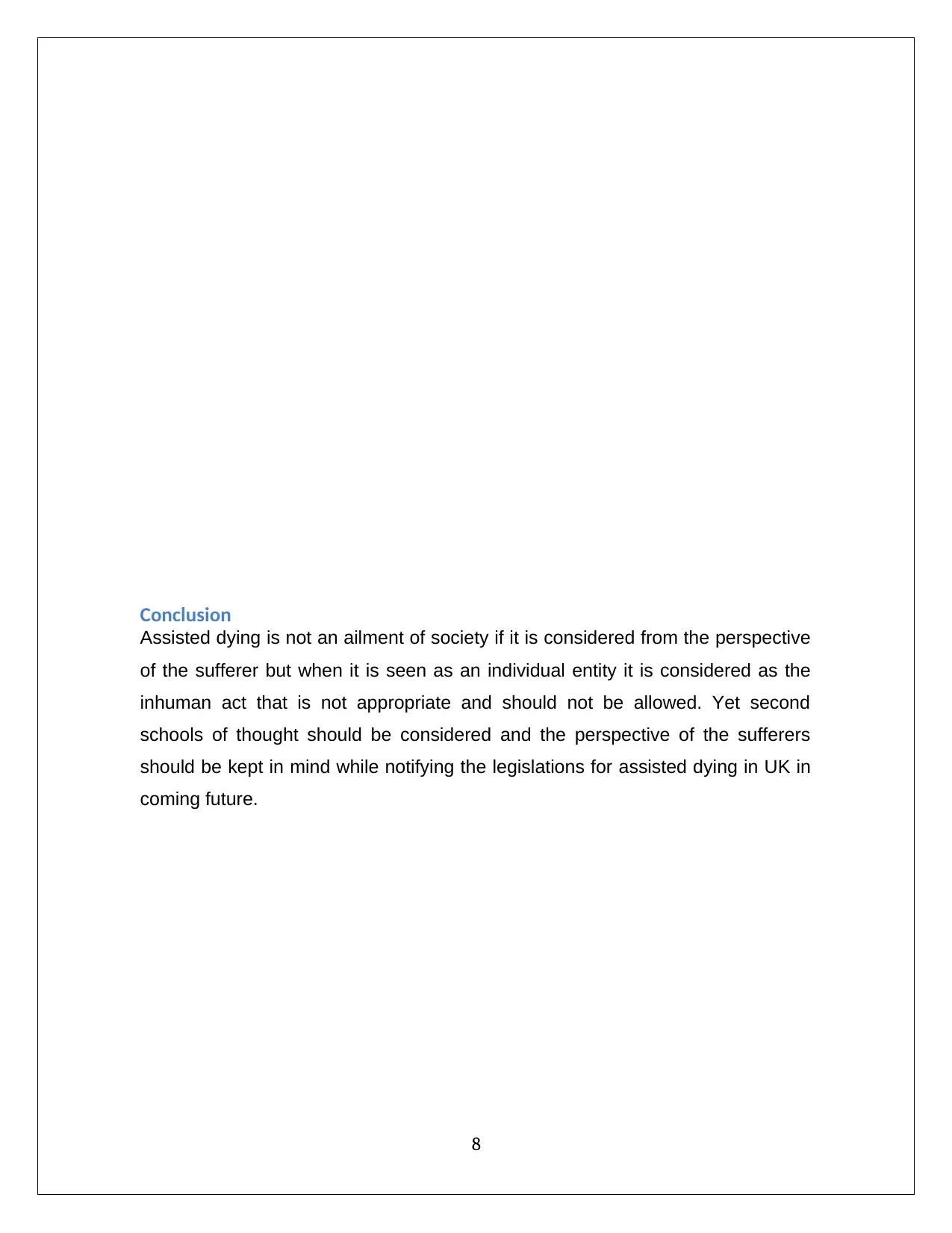
Conclusion
Assisted dying is not an ailment of society if it is considered from the perspective
of the sufferer but when it is seen as an individual entity it is considered as the
inhuman act that is not appropriate and should not be allowed. Yet second
schools of thought should be considered and the perspective of the sufferers
should be kept in mind while notifying the legislations for assisted dying in UK in
coming future.
8
Assisted dying is not an ailment of society if it is considered from the perspective
of the sufferer but when it is seen as an individual entity it is considered as the
inhuman act that is not appropriate and should not be allowed. Yet second
schools of thought should be considered and the perspective of the sufferers
should be kept in mind while notifying the legislations for assisted dying in UK in
coming future.
8
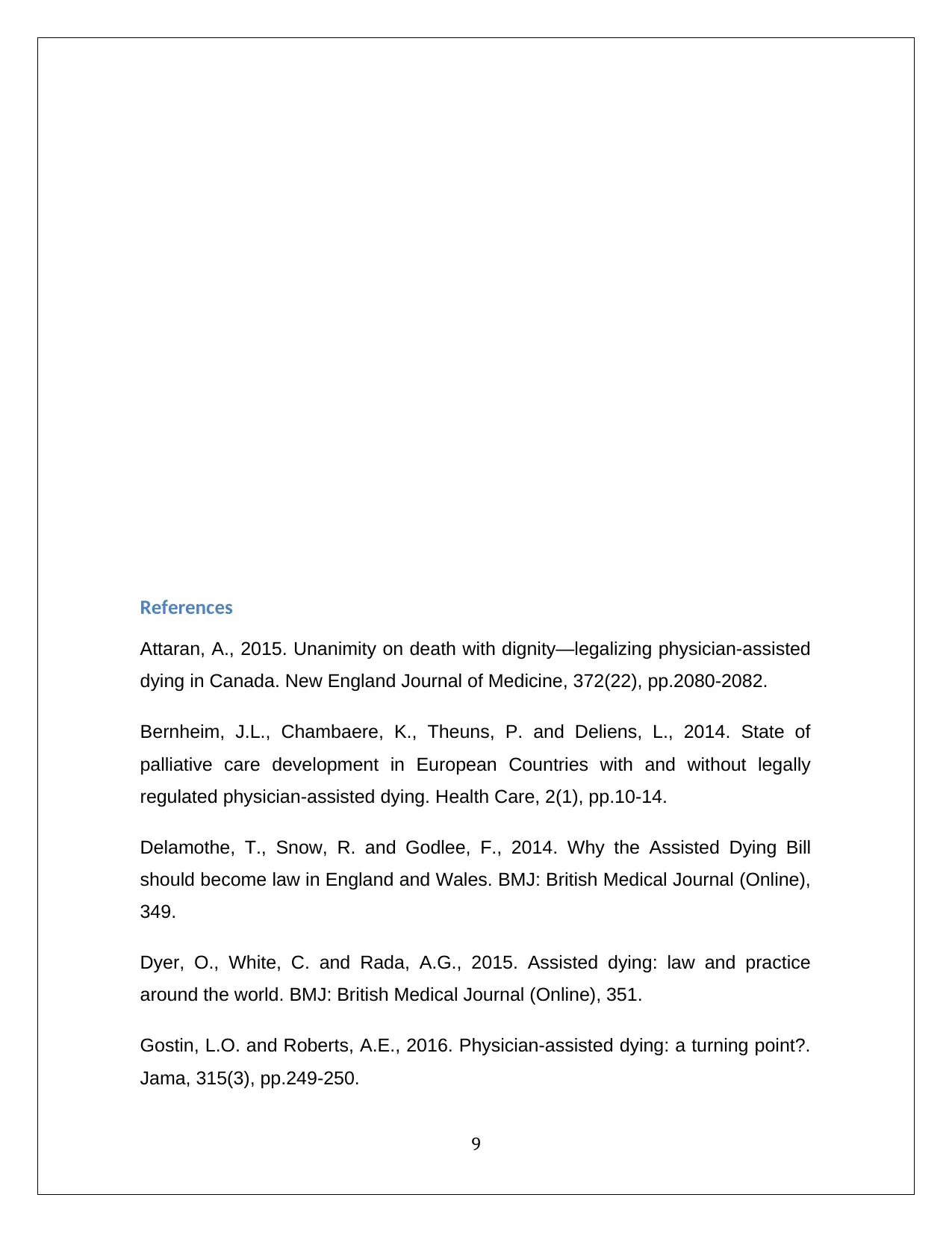
References
Attaran, A., 2015. Unanimity on death with dignity—legalizing physician-assisted
dying in Canada. New England Journal of Medicine, 372(22), pp.2080-2082.
Bernheim, J.L., Chambaere, K., Theuns, P. and Deliens, L., 2014. State of
palliative care development in European Countries with and without legally
regulated physician-assisted dying. Health Care, 2(1), pp.10-14.
Delamothe, T., Snow, R. and Godlee, F., 2014. Why the Assisted Dying Bill
should become law in England and Wales. BMJ: British Medical Journal (Online),
349.
Dyer, O., White, C. and Rada, A.G., 2015. Assisted dying: law and practice
around the world. BMJ: British Medical Journal (Online), 351.
Gostin, L.O. and Roberts, A.E., 2016. Physician-assisted dying: a turning point?.
Jama, 315(3), pp.249-250.
9
Attaran, A., 2015. Unanimity on death with dignity—legalizing physician-assisted
dying in Canada. New England Journal of Medicine, 372(22), pp.2080-2082.
Bernheim, J.L., Chambaere, K., Theuns, P. and Deliens, L., 2014. State of
palliative care development in European Countries with and without legally
regulated physician-assisted dying. Health Care, 2(1), pp.10-14.
Delamothe, T., Snow, R. and Godlee, F., 2014. Why the Assisted Dying Bill
should become law in England and Wales. BMJ: British Medical Journal (Online),
349.
Dyer, O., White, C. and Rada, A.G., 2015. Assisted dying: law and practice
around the world. BMJ: British Medical Journal (Online), 351.
Gostin, L.O. and Roberts, A.E., 2016. Physician-assisted dying: a turning point?.
Jama, 315(3), pp.249-250.
9
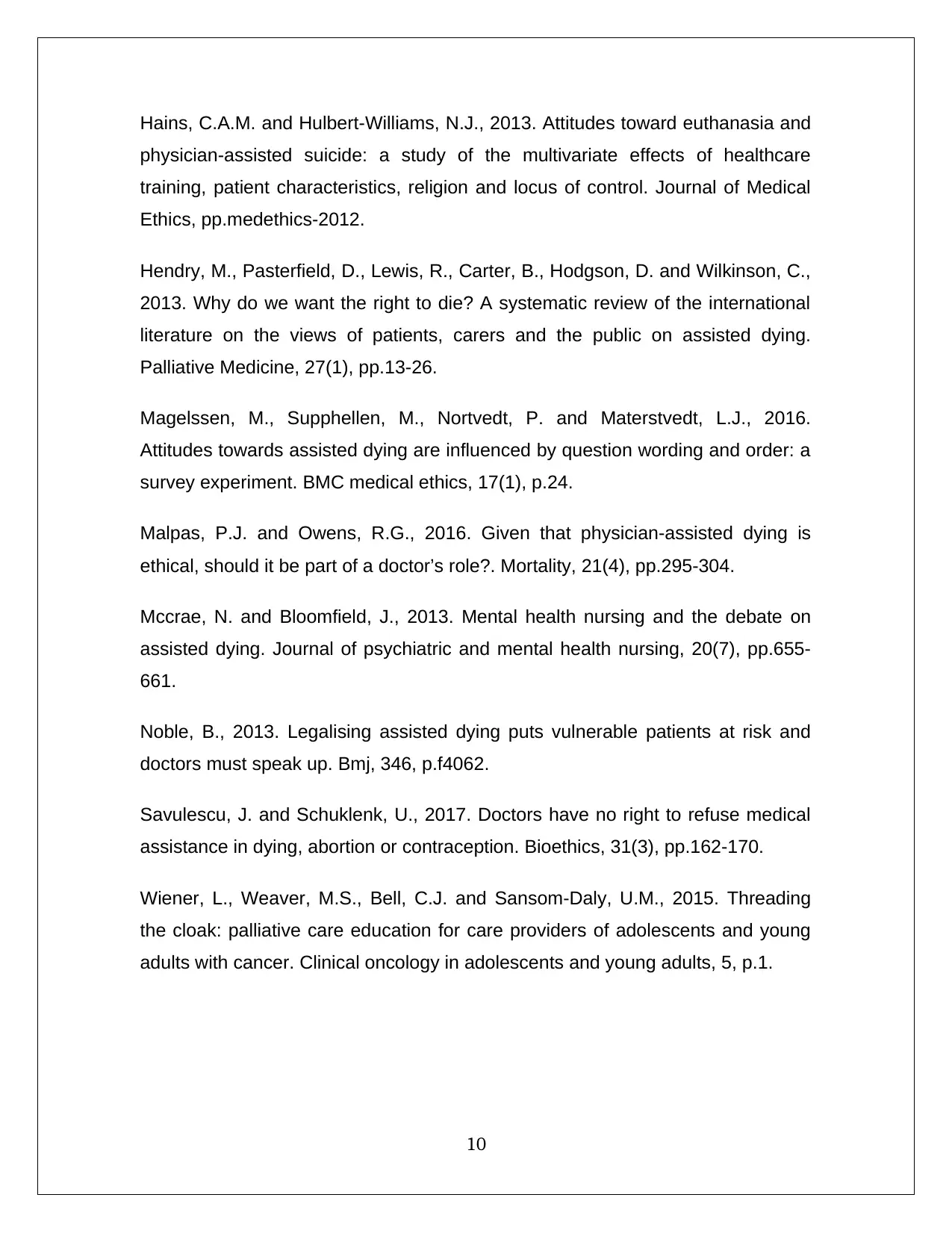
Hains, C.A.M. and Hulbert-Williams, N.J., 2013. Attitudes toward euthanasia and
physician-assisted suicide: a study of the multivariate effects of healthcare
training, patient characteristics, religion and locus of control. Journal of Medical
Ethics, pp.medethics-2012.
Hendry, M., Pasterfield, D., Lewis, R., Carter, B., Hodgson, D. and Wilkinson, C.,
2013. Why do we want the right to die? A systematic review of the international
literature on the views of patients, carers and the public on assisted dying.
Palliative Medicine, 27(1), pp.13-26.
Magelssen, M., Supphellen, M., Nortvedt, P. and Materstvedt, L.J., 2016.
Attitudes towards assisted dying are influenced by question wording and order: a
survey experiment. BMC medical ethics, 17(1), p.24.
Malpas, P.J. and Owens, R.G., 2016. Given that physician-assisted dying is
ethical, should it be part of a doctor’s role?. Mortality, 21(4), pp.295-304.
Mccrae, N. and Bloomfield, J., 2013. Mental health nursing and the debate on
assisted dying. Journal of psychiatric and mental health nursing, 20(7), pp.655-
661.
Noble, B., 2013. Legalising assisted dying puts vulnerable patients at risk and
doctors must speak up. Bmj, 346, p.f4062.
Savulescu, J. and Schuklenk, U., 2017. Doctors have no right to refuse medical
assistance in dying, abortion or contraception. Bioethics, 31(3), pp.162-170.
Wiener, L., Weaver, M.S., Bell, C.J. and Sansom-Daly, U.M., 2015. Threading
the cloak: palliative care education for care providers of adolescents and young
adults with cancer. Clinical oncology in adolescents and young adults, 5, p.1.
10
physician-assisted suicide: a study of the multivariate effects of healthcare
training, patient characteristics, religion and locus of control. Journal of Medical
Ethics, pp.medethics-2012.
Hendry, M., Pasterfield, D., Lewis, R., Carter, B., Hodgson, D. and Wilkinson, C.,
2013. Why do we want the right to die? A systematic review of the international
literature on the views of patients, carers and the public on assisted dying.
Palliative Medicine, 27(1), pp.13-26.
Magelssen, M., Supphellen, M., Nortvedt, P. and Materstvedt, L.J., 2016.
Attitudes towards assisted dying are influenced by question wording and order: a
survey experiment. BMC medical ethics, 17(1), p.24.
Malpas, P.J. and Owens, R.G., 2016. Given that physician-assisted dying is
ethical, should it be part of a doctor’s role?. Mortality, 21(4), pp.295-304.
Mccrae, N. and Bloomfield, J., 2013. Mental health nursing and the debate on
assisted dying. Journal of psychiatric and mental health nursing, 20(7), pp.655-
661.
Noble, B., 2013. Legalising assisted dying puts vulnerable patients at risk and
doctors must speak up. Bmj, 346, p.f4062.
Savulescu, J. and Schuklenk, U., 2017. Doctors have no right to refuse medical
assistance in dying, abortion or contraception. Bioethics, 31(3), pp.162-170.
Wiener, L., Weaver, M.S., Bell, C.J. and Sansom-Daly, U.M., 2015. Threading
the cloak: palliative care education for care providers of adolescents and young
adults with cancer. Clinical oncology in adolescents and young adults, 5, p.1.
10
1 out of 10
Related Documents
Your All-in-One AI-Powered Toolkit for Academic Success.
+13062052269
info@desklib.com
Available 24*7 on WhatsApp / Email
![[object Object]](/_next/static/media/star-bottom.7253800d.svg)
Unlock your academic potential
© 2024 | Zucol Services PVT LTD | All rights reserved.





